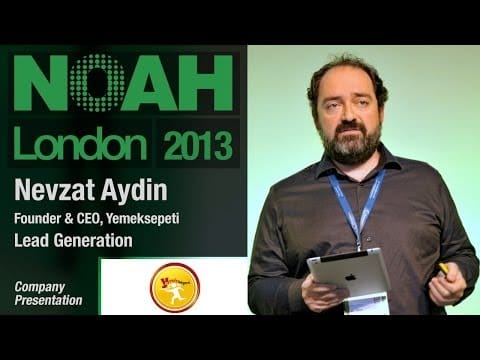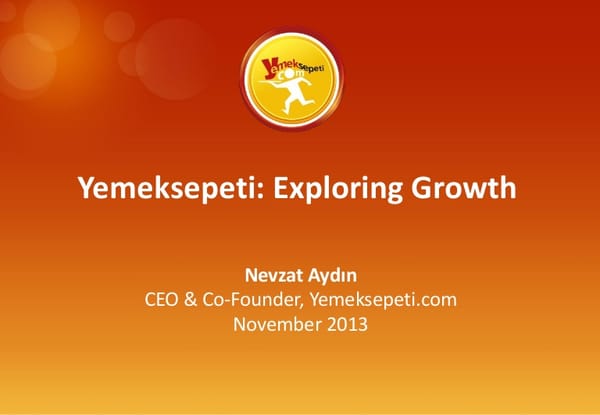Nevzat Aydin- Founder & CEO, Yemeksepeti
Nevzat Aydin is the CEO of Yemeksepeti, the leading online food delivery portal in Turkey. He was among the 150 entrepreneurs invited from all around the world to the Entrepreneurship Summit held by Barack Obama in 2010.


Venture capitalists and private equity firms are spending more and more time in Istanbul and that doesn't look likely to change any time soon. The country is not only producing domestic e-commerce giants, it is starting to build companies with traction in other emerging markets.
The domestic market holds lots of promise: mobile phone penetration is high and Turkey has an estimated 38 million Internet users out of a population of 77 million. Unlike Russia, where people prefer to pay cash, in Turkey more than 60% of adults use credit cards. Logistics aren't an issue either - it is possible to send packages anywhere in Turkey for $2 within two business days.
That's not all. More than 70% of the population is under 35, according to research firm comScore, and they're big consumers of social media: Turkey is the sixth-largest country on Facebook.
Companies targeting the domestic market are attracting plenty of foreign capital; here are just a few of the recent details that have been done:
· Yemeksepeti, food delivery site: sold a minority stake to General Atlantic in September for $44 million (see the story on pages one and 19).
· Markafoni, a private shopping club: Naspers acquired 70% this year for an undisclosed sum.
· Mackolik, a portal/news site for sports: British media group Perform Groupacquired an initial 51% stake in the business for £14.6 million this year. Perform will acquire the remaining 49% for cash, based on an agreed ten times multiple calculation of the average full year audited EBITDA results of the business for the years ending 31 December 2014 and 2015 weighted 25% and 75% respectively, with maximum additional consideration payable in March 2016 of up to £60.4 million.
· GittiGidiyor, an auction site: eBay acquired a majority stake in the company in 2011; terms were not disclosed.
· Nokta, a portal and news and video group of companies:Intel Capital acquired a rumored 8.47% of Nokta shares for $2.5 million.
· Trendyol.com raised $26 million from Tiger Global and KPCB in 2011.
· In December 2011 Amazon acquired a minority stake in Cicekesepeti, an online flower and gifts site.
The big deals are grabbing headlines but whether Turkey will be able to transform its tiny but rapidly-evolving tech sector into a well-functioning eco-system is still an open question.
"Given the overheated economy and relatively weak technology transfer from universities, it is no surprise that most start-up activity in Turkey to date has been focused on e-commerce," says a 2012 report prepared for a global entrepreneurship conference. Entrepreneurship activity is concentrated in Istanbul and Ankara. Local angel and venture capital activity is limited, and entrepreneurship-related public policies and programs are complex.
Still, there are positive signs. The government is taking steps to make angel investing more attractive through tax breaks, says Ahmet Ussal Sahbaz, who helps organize visits to Turkey for delegations focused on entrepreneurship.
And in the past year 212, a local venture capital firm, was set up by Numan Numan and Ali Karabey, two Turkish natives with overseas experience and strong chops in tech and finance.
Most recently, Numan was a vice president at Goldman Sachs, where he spent 12 years as a technology evangelist in the firm's leadership team, working in the Tokyo and New York offices. Working closely with the firm's private equity and venture capital arms, Numan identified and evaluated start-up companies around the world. Prior to Goldman Sachs, Numan provided technology solutions and built support systems at both regional and global levels for companies such as CS First Boston, Dun & Bradstreet, and GTE.
Karabey, who holds a degree in finance from the University of Michigan, Ann Arbor, worked in Arthur Andersen's New York office in the Corporate Finance department, executing mid-market transactions in technology, media and telecommunications industries. In 2002 he joined Morgan Stanley Capital International to manage North American and European finance teams consecutively and later worked for Deutsche Bank.
Karabey moved back to Istanbul in 2008 and started consulting with clients in the government and private sector on private equity advisory projects. Numan and Karabey met at a business angels get-together in Istanbul and decided to start their own fund, raising $30 million.
Since the turn of the year 212 has invested in six young Turkish companies: online fashion retailer Butigo.com; personal care company Balerin.com; social gaming studio ArcadeMonk; short-term rental marketplace hemenkiralik.com; Hazinem.com, an on-line jewelry site, and hospitality software provider Cloudarena.
While only a few foreign venture firms, such as Intel Capital and Germany's Earlybird, have set up offices in Istanbul VC and PE firms such as Accel Partners, Index Ventures, Atomico and Silver Lake are making increasingly regular visits and Hummingbird has a representative stationed there.
Among the new wave of Turkish start-ups attracting attention and capital from foreign investors is Peak Games. The two-year-old social gaming company has 12 million daily and 35 million monthly active users, making it the third-largest social gaming company in the world in terms of traffic. Its games exclusively target emerging markets. The company has raised $20 million in funding from institutional investors, including Earlybird and Hummingbird.
Peak Games' phenomenal growth puts it in the same league as some of the home runs of the tech world: It claims to have more active users than Foursquare and Pinterest and to have reached its first 10 million users in just 270 days, much faster than it took Twitter and Facebook to reach those numbers.
Turkey is close in culture to the Middle East so it is a natural route to expansion for companies like on-line food retailer Yemeksepeti and Peak Games, says 212's Numan.
Combined, Turkey and Middle Eastern countries accounted for 113 million Internet users in 2011; but that number is expected to more than double, to 300 million by 2015, while the number of mobile phones is expected to jump from 15 million to 100 million.
"By focusing on these rapidly-growing emerging markets, we ended up being able to get ahead of global competitors that target the whole world," says Rina Ohur, co-founder and chief strategy officer of Peak Games. It is that kind of thinking and that kind of focus that is likely to lure more and more investors to Istanbul.
